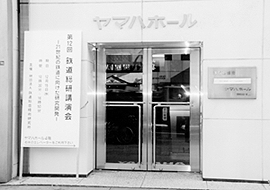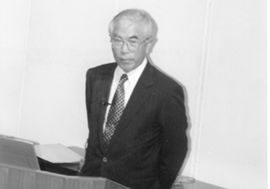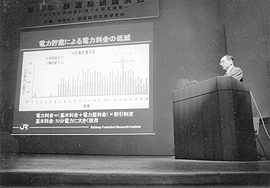
The Twelfth Lecture of Railway Technical Research Institute was held on December 15, 1999. The lecture is held once a year intended for people in a wide variety of fields. The theme of this lecture is "Research and Development of Railway toward the 21st Century". The lecture discussed various topics of railway such as future transportation systems, energy, environment and fundamental and applied research while drawing their future images. The lecture was held at YAMAHA Hall (Tokyo) and about 340 audiences mainly consisting of people concerned of JR, private railway companies and companies related to railway business gathered.
The following are the subjects, lecturers and abstracts of the lectures.

Special lecture "Mobility of the 21st Century Society and Railway" (Professor Eisuke Masada, Science University of Tokyo)
Under the globalization of industrial activities and development of the international network, the 21st century society seeks more advanced and diversified mobility. On the other hand, the boundary between road traffic and railway is becoming ever more unclear, as with the case of ITS(Intelligent Traffic System), fruit of advanced information control technology. In addition, it is expected that the business contents and services of railway are going to be diversified due to the relaxation of business regulation. How railway should act under the circumstances and change itself was presented in this lecture. He mentioned the ideal way of the railway in the 21st century, technological problems to realize it and technological seeds that are thought to be useful to find effective solutions for the problems, including the future of peripheral technologies such as energy, information communications and materials. In addition, he referred to the necessary development and preparation of the conditions for the practical use of the idea. As specific research themes, he listed the improvement of the railway mobility, restructuring of railway network by the improved mobility and further investigation of fundamental common technologies.

General Lecture "Railway and ITS" (Takahiko Ogino, Transport Systems Development Division of RTRI)
Since the development of ITS was begun for tackling various problems produced by automobile society, its concept is mainly focused on automobiles though the term "traffic" is used. As public transportation systems including railway are advanced in Japan, not only the conta~ of road traffic with the public transportation but also their active cooperation should be considered for achieving an efficient ITS. In this lecture, a concept of intermodal transportation of travelers through the mutual cooperation of public transportation systems and their cooperation with road traffic is newly named "Cyber Rail", which is proposed as a realization form of ITS in Japan. For its achievement, current railway transportation system has to become more flexible. Therefore several research themes were addressed from the point of view of information processing such as proposal of intramodal transportation and the use of mobile radio communication networks.

General Lecture "Railway Technology for Energy Saving and New Energy" (Yoshifumi Mochinaga, Power Supply Technology Development Division of RTRI/ Tomoki Watanabe, Traction Control Group of RTRI)
As an electric railway can create large output, it is a vehicle which energy efficiency is high. For example, total electricity used by seven JR companies and private railway companies was 20.9 billion kWh in fiscal 1996, indicating that saving operating electricity is a crucial task for railway business. Therefore lightening of the vehicle, effective utilization of regenerative energy, and operation in energy conservation are important. On the other hand, the electric railway is a load with significant fluctuations. Therefore leveling the peak loading and limiting voltage fluctuation by the electric power storage are desirable for the effective utilization of electric power facilities. Photovoltaic power generation expected as the global-
environment-friendly new energy, the fuel cell viewed as a promising future technology, and vehicles installed with hydrogen engine are presented in the lecture.
General lecture "The Ecology of the Railway" (Naoto Mifune, ISO14001 Registration Center of RTRI)
Ecology awareness is rapidly surging in Japan because of a series of environmental issues. Main targets and problems include "sustainable development" in the Earth Summit in 1992, "industrial waste problem" that became actualized around 1996, "greenhouse gas reduction" in Kyoto Protocol to the United Nations Framework Convention on Climate Change (COP3) in 1997 and "dioxin disaster" by refuse disposal institutions that became a great issue this year. With these trends as a background, acts concerning the environmental conservation such as "Law concerning the rational use of energy", "Pollutant Release and Transfer Register (PRTR)" and "Law concerning special measures against dioxins" have been rapidly established. In such world, railway business is required to develop in a system with ecology consciousness. In this lecture, the relationship between total trend of ecology and railway was
discussed, and recycling materials, saving energy and ecomaterial ideas were reported as ecology problems in railway.
General Lecture "Railway System in Barrier Free Era" (Toshihiko Aoki, Architecture Group of RTRI Hiroaki Suzuki, Ergonomics Laboratory of RTRI)
As it seems to be certain that Japanese society has to confront ultra-aging problem that accompanies decrease in total population in the early 21st century, more carefully thought out care for railway users is required. Therefore a new railway system is necessary, which is established based on the conception of "universal design" that is convenient for all users rather than based on "barrier-free" for the disabled and aged. In the lecture, it is presented what kind of system changes are needed for future railway concerning information service, the transfer in the station premise, passenger accommodations, facility in the car and operation system. In addition, as railway has to compete with other transportation measures while cooperating with them, it was proposed a way of thinking about the amenity standard which next generation railway system should satisfy.
General Lecture "Possible Application of Superconducting Technology to Existing Railways" (Hiroshi Nakashima, Maglev System Development Department of RTRI)
Typical application of superconducting magnet to railway is maglev railway system. However, currently it is not applied to existing railway systems at all since technological problems of cooling do not allow the application. However technologies accompanied with a high temperature superconducting magnet discovered about 10 years ago are advancing more than expected at that time and it may be put into practical use in liquid nitrogen temperature region. As a result, application of a superconducting magnet may expand in the wide field and existing railway systems are no exception. In the lecture, individual examples about attractiveness of these superconducting technologies and their application to existing railway systems are presented, such as transformers, motors, energy storage and transmission, application of sensing technology, actuators and flywheels.
General Lecture "Basic Researches of Railway toward the 21st Century" (Hisashi Tarumi, Fundamental Research Division of RTRI)
In order to maintain the development of railway in the 21st century, we have to promote research and development while considering diversifying value systems of users and conformity to social environment. As problems to tackle are becoming ever more difficult, research and development must be activated by promoting fundamental research that aims at clarification of the phenomena peculiar to the railway system and introduction of new materials and technologies for breakthrough. In the future plan of Railway Technical Research Institute, they are increasingly attaching importance to fundamental research. In the lecture, he mentioned significance of fundamental researches and introduced the examples of current research such as study of phenomena induced by rolling contact of rail/wheel, aerodynamic noise, evaluation of the safety of signaling systems and riding comfort, and environmental monitoring using organisms. He also introduced research themes that are possibly applied in the future and outlined research and development in other fields. And as a direction of fundamental researches in the future railway, he referred to improvement of its reliability as a transportation mechanism, cost reduction of railway business, attractive railway transportation, and railway in harmony with environment.